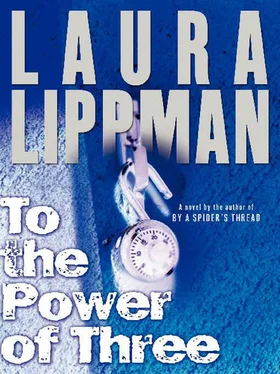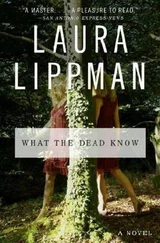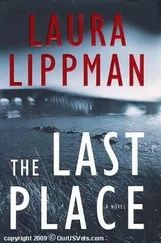“Interesting,” he said. “I hadn’t thought about that. So should I go about it a different way? Are there any individuals I should seek out?”
She thought of Eve but hurriedly pushed the girl out of her thoughts, as if fearful that this policeman could read her mind. Eve was hers.
“Well, Josie Patel, obviously. She’s the only eyewitness, right?”
“Right,” the sergeant said in his agreeable tone, so why did Alexa have the feeling he wasn’t really agreeing with her? “Still, I’d like to speak at this confab. Just for two minutes, maybe at the very beginning. Then you can get down to the serious business at hand.”
“You sound a little…sarcastic.” Like her brother, the day before. She was tired of people making fun of what she did.
“Do I? I don’t mean to. I think grief counseling is a good thing. Posttraumatic stress, all that stuff. They talk a lot about it in my shop.”
“Have you…?”
“Oh, it’s not for me.”
“No, I wasn’t asking if you’ve had it, just if-Well, you must have seen a lot. As a detective.”
“I’m in homicide. My whole life is posttrauma. But it’s not what I’ve seen that’s likely to bother me. It’s what I’ve heard . The confessions. The rationalizations. The lack of rationalizations. You can’t believe how thoughtlessly some lives are ended, how little goes into the decision. Makes me sad.”
Me, too, she wanted to say, yet she knew it was inane, a guidance counselor claiming kinship with a homicide detective. Still, it was amazing, the stories that teenage girls confided, once they felt safe. Their confused notions of sex, the things they were willing to do for the tiniest scrap of male attention, the viciousness of other girls.
“Look, you really shouldn’t go before the assembly. You’re just going to end up trying to sort a lot of chaff from the wheat, the attention hogs and liars.”
“Everybody lies. It’s the cardinal rule of homicide investigations.”
Alexa blushed, feeling that he had seen through her own omissions, her refusal to mention Eve. But there was no way she could turn Eve over to police. The girl would never trust her again.
His cell phone rang, a strangely straightforward ring to Alexa’s ears, inured to the elaborate tones that the kids downloaded. ABBA was big, for some reason. “Dancing Queen” and “ Waterloo ” always seemed to be coming out of someone’s purse or backpack these days. There also was a lot of hip-hop, at least among the boys, a hilarious affectation at Glendale, where only 5 percent of the student body was African-American and almost everyone was well-to-do.
The sergeant took the call, his monosyllabic responses revealing little about the information conveyed. Really? Do we need a lab tech? Okay. Okay. Okay.
“I guess it’s all moot for now,” he said, snapping the phone shut and placing it back on his belt. “Something-well, maybe nothing, really, but it takes priority. You could ask for us, though, couldn’t you? Ask the kids to call me or my partner, give out our numbers. In whatever way you think would elicit the best responses.”
He hit the word “elicit” hard, as if he expected her to be surprised by the usage. As if she thought he was stupid, when she was now quite sure he was anything but.
“I’ll do my best,” she promised.
“Good girl.”
She disliked him for that-in part because it was so patronizing, as if he were old enough to be her father, and maybe he was, but he should treat her as the professional she was, his equal.
And in part because, having heard it, she wanted to hear it again, wanted this man’s approval.
Wanted, in fact, an excuse to talk to him again. Because while his partner was not her type, Lenhardt definitely could be. Was he married? She hadn’t noticed a ring. Not that all men wore rings. Her father certainly hadn’t. Besides, she just wanted to talk to this man, get to know him better. There was nothing illicit about that.
Peter knew it was a bad ideato go to the high school Monday morning, but he just couldn’t help himself. He was bored out of his mind. Television was all girly stuff, even on pay cable-clearly no self-respecting man was supposed to be watching television before noon. The Glendale pool didn’t have weekday hours until later in the summer, and the early-June days were too cool for swimming anyway. Besides, he wasn’t sure how the producers would feel about him tanning. Guy Pearce was a pretty pale guy, although there was a hint of olive in his complexion. With all those self-tanners on the market, Peter could always go darker fast if need be, whereas if he overtanned, there was no makeup in the world that could take it down. Too bad, because Peter tanned beautifully.
A year ago, even as recently as Christmas, Peter might have found some of his old compadres hanging around Glendale, but college graduation had changed that dynamic. People had jobs or internships, or else they were doing big trips before they plunged into grad school. There were no students at the high school who knew him, although the real drama geeks might remember him from his community-theater work.
But his drama teacher was still on the faculty, and Peter couldn’t resist going up there, sharing his big news. Old Giff would be so happy for him. Really, it would be a favor to him, letting him be the first to know that one of his former students was succeeding at such a high level.
Vans from the local television stations were parked on the shoulder along Glendale Circle, and Peter had a hunch some security guy would be posted at the front door, making sure that all visitors reported to the office. But these were his old stomping grounds. He knew tricks that no reporter, no stranger, ever could. Instead of heading to the front doors, he ambled to one of the breezeways, losing himself in the crowd of students during a class change. The kids glanced his way-they weren’t fooled by the twenty-two-year-old impostor among them-but didn’t challenge him, just kept up their own manic chatter. It took him a second to tune in to their frequency, and when he did, he realized that all the buzzing was about the shooting. Of course.
Old Giff was sitting in a chair on the stage, and in the split second before he realized he was being observed, he reminded Peter of a particularly poignant Malvolio from a Lincoln Center production of Twelfth Night, and it wasn’t just because he wore bright yellow trousers. Giff had a rubbery, comic countenance, the kind made for Neil Simon’s earlier plays, but left to its own devices, Old Giff’s face sagged into melancholic lines and folds. He looked lonely and unloved, and in full knowledge of the fact that he was lonely and unloved. In high school Peter had refused to think about Giff’s sexuality, not that he had a problem with people being gay or whatever. Peter had even threatened to beat up an oafish freshman who threw the word “faggot” around a little too carelessly. It was just that if he conceded Giff was gay, then he would have to wonder if the older man’s devotion to him was based on Peter’s talent or some latent attraction.
But of course he was gay, Peter thought now.
“Lasko!” the teacher cried out, his face truly lighting up. “What a welcome surprise at such a sad, sad time. Did you come back for Kat’s funeral?”
The question shamed Peter a little. But it wasn’t his fault that he had planned his trip before Kat was killed, he reminded himself.
“Yeah,” he said. “Of course.”
“Isn’t it horrible?”
“Horrible doesn’t begin to approach it. What happened anyway?”
“No one knows. Perri lost her mind, I guess. Lord, I feel terrible about it. She was in my homeroom, you know.”
Читать дальше












